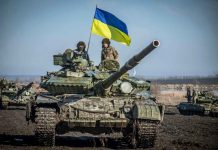UKRAINE – NEWS – The World Health Organization says one of the unseen costs of the Ukraine War will be in trying to access the food needed to feed the world’s hungry. The added cost of purchased food, Dr Flavio Salio, WHO Emergency Medical Team Network Leader, speaking from from the Poland-Ukraine border about moving WHO emergency supplies to Ukraine says it will cost an estimated $60 to $75 million more per month.
Access to food from Ukraine is now in doubt, and Ukraine has been one of the world’s bread baskets. The increased costs mean more people in areas needing food aid are going to go hungry.
The price of grain is already climbing, as is the price of diesel fuel. Depending on what happens with the war in Ukraine, it is hard to estimate how high prices will go.
At a United Nations / World Health Organization Press Conference, James Elder, for the United Nations Children’s Fund (UNICEF), connecting from Lviv in Ukraine, said that “500,000 children had been forced to flee their homes in just seven days, which was unprecedented. We also had to think of those who could not escape, including children in collective children’s homes and children with disabilities. Thousands of children had to spend numerous nights in cold bunkers and underground shelters. Humanitarian needs were multiplying by the hour, and many people were cut off from essential services, including health care. A UNICEF humanitarian convoy was on its way, but as long as the conflict continued, the demand would outstrip the supply. Mr. Elder spoke of multiple examples of solidarity he had witnessed on the ground in Ukraine”.
Joung-ah Ghedini-Williams, for the United Nations Refugee Agency (UNHCR), connecting from Palanca in Moldova, said that “The rate of the ongoing exodus was phenomenal. Numbers were increasing hourly, with immense lines of cars on the borders. Ms. Williams spoke of families she had encountered who had told her of the dilemmas they faced whether to leave their homes to protect themselves and save their children, or to stay with their other family members. The latest figures from previous night showed that there were already over one million refugees, with at least as many internally displaced persons within Ukraine”.
A UNHCR convoy with supplies was on its way to Moldova from Greece. All efforts were made to scale up the humanitarian response. Shabia Mantoo, also for the UNHCR, added that the current figure stood at 1,045,000 people who had fled Ukraine. Latest information could be accessed at the UNHCR portal.
Dr. Flavio Salio, Emergency Medical Team Network Leader at the World Health Organization (WHO), connecting from the Poland-Ukraine border, said that “The first WHO cargo shipment with emergency supplies had arrived in Warsaw, was now moving towards the border, and would cross soon into Ukraine. WHO was assessing the needs at both Polish and Ukrainian sides. Possible medical evacuations of civilians would also need to be looked into carefully; safe humanitarian access was paramount in this regard”.
Christian Lindmeier, also for the World Health Organization (WHO), added that within Ukraine, the WHO was looking into setting up field hospitals and supporting local medical centers. There would be no setting up of field hospitals in neighboring countries. Tarik Jašarević, another WHO spokesperson, would be in Poland as of tonight.
Jens Laerke, for the Office for the Coordination of Humanitarian Affairs (OCHA), stated that, “OCHA welcomed the reports that the two sides had agreed to facilitate safe passage of civilians from conflict areas. Millions of people needed safe passage and humanitarian assistance. Such passage ought to guarantee dignity and safety of civilians. Humanitarian agencies should also have safe and unhindered access to all areas in need. In recent days, many cities had experienced relentless shelling, which had affected access to essential services. Dwindling cash reserves and empty ATM machines were affecting people’s abilities to purchase necessities”.
Mr. Laerke stressed that OCHA had not yet received anything in writing from the two sides; there was no written confirmation on the establishment of humanitarian corridors. Immediately after the two humanitarian appeals had been launched by OCHA and UNHCR on 1 March, more than USD 1.5 billion had been pledged, which was impressive. Still, those pledges were not money in the bank; money was urgently needed and had to be transferred to the involved agencies.
Paul Dillon, for the International Organization for Migration (IOM), added that as of 9:30 local time Friday, March 4, 2022, that over 1.2 million people had fled Ukraine; more than half of them were in Poland. Among them there were over 78,000 third-country nationals from 138 countries; IOM was concerned over the reports of xenophobia and racism those people had faced on their journey. Such reports needed to be addressed. IOM had eight field offices in Ukraine, ready to be mobilized as soon as the situation allowed. Mr. Dillon also specified that the wait time along the Ukrainian-Polish border ranged from 24 to 36 hours.
Responding to questions, Mr. Elder said that UNICEF’s global hub was in Copenhagen, Denmark, from where supplies were being sent to Ukraine. The western city of Lviv had received an unprecedented influx of people, and medical services were trying to cope, and preparing for an increase in injured people, including children. The funding needs had tripled over the past week, and, as long as the bombing continued, the needs would continue to outstrip the supplies. Mr. Elder said that the verified figures of children killed or injured were very likely an underestimate. There was an absolute necessity for UN humanitarian agencies to be able to reach people in need.
On another question, Ms. Ghedini-Williams said that the UNHCR appeal from earlier this week seemed to be on the way to be fully funded; exact numbers would be provided subsequently. Over USD 85 million funding had been already volunteered from the private donors in the last days; the IKEA Foundation, H&M, and Volkswagen were among those donors. There were many individual donations in addition to corporate ones. She reminded of other crises, including Yemen and Ethiopia, where the appeals were only partially funded.
Dr. Salio, replying to a question, stated that the plan was to establish trauma stabilization medical points – triages – as close as possible to the points where people were being injured. It was also important to establish a support network outside of Ukraine, for people with medical needs crossing into other countries.
Several journalists raised questions about the banning of Russian journalists from certain countries and the reported harassment of Russian nationals. On another question, Alessandra Vellucci, for the United Nations Information Service (UNIS), said that the journalists accredited to UN Geneva, no matter where they were from, could continue to do their work normally.




